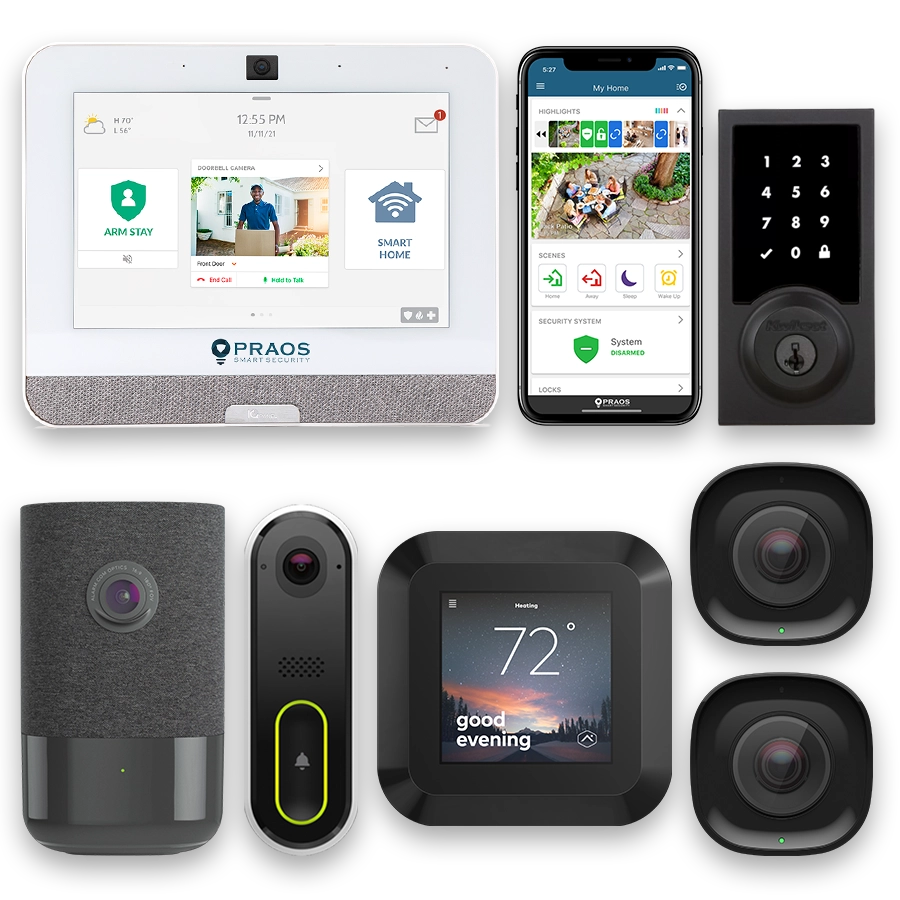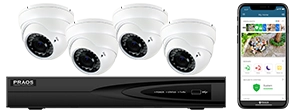Introduction to AI in Home Security Systems
The integration of Artificial Intelligence (AI) into modern home security systems marks a significant development in the realm of safety and protection. By leveraging advanced algorithms and machine learning, AI enhances the capabilities of home security systems, providing more efficient and accurate threat detection and response mechanisms. This chapter will provide an introduction to how AI is transforming home security systems, focusing on key aspects such as the types of AI technologies used and their primary functions.
Types of AI Technologies in Home Security
AI technologies employed in home security systems generally fall under several categories, each serving particular functions:
- Machine Learning: Utilizes algorithms that learn and improve from experience over time, enhancing the accuracy of security predictions and threat assessments.
- Computer Vision: Involves the use of AI to interpret and understand visual data from surveillance cameras, enabling features such as facial recognition and anomaly detection.
- Natural Language Processing (NLP): Enables systems to understand and respond to voice commands, improving the ease of use and integration with smart home devices.
Together, these technologies form a comprehensive net of security measures that surpass traditional, non-AI systems in efficiency and reliability.
Primary Functions of AI in Home Security Systems
AI enhances home security systems in several key ways:
- Real-Time Threat Detection: AI continuously monitors surveillance data and detects unusual behavior or potential threats instantly, reducing response times.
- Predictive Analytics: By analyzing historical data, AI can forecast potential security breaches or vulnerabilities, allowing for preemptive actions.
- Automated Response: AI systems can automatically trigger alarms, notify authorities, or lock doors in response to detected threats.
These functionalities contribute to a robust and proactive security environment within homes.
Advantages of AI in Home Security
AI-powered home security systems offer numerous advantages over traditional systems:
| Advantage | Description |
|---|---|
| Enhanced Accuracy | AI reduces false alarms by accurately distinguishing between real threats and benign activities. |
| Efficient Monitoring | AI systems can manage and analyze vast amounts of data more efficiently than human operators. |
| Scalability | AI solutions can be easily scaled and updated to adapt to evolving security needs and technological advancements. |
Overall, AI significantly elevates the functionality and reliability of home security systems, offering enhanced protection features that cater to the dynamic nature of modern security requirements.
Evolution of Home Security Technology
The evolution of home security technology has been marked by several significant advancements over the past few decades. The integration of Artificial Intelligence (AI) into home security systems represents the latest and most transformative phase in this evolution.
Early Home Security Systems
Early home security technology primarily relied on basic mechanical systems that provided limited protection. These systems typically included simple locks, alarms, and basic camera setups. The primary focus was on deterrence rather than active threat detection or response.
Introduction of Digital Technology
With the advent of digital technology, home security systems began to incorporate more sophisticated features. Digital cameras, motion sensors, and internet connectivity became standard, allowing for remote monitoring and control. These advancements significantly improved the effectiveness of home security systems by providing homeowners with real-time data and alerts.
Emergence of Smart Home Technology
The rise of smart home technology further revolutionized home security. Devices such as smart locks, video doorbells, and integrated security systems became more accessible and user-friendly. Smart home technology enabled homeowners to control their security systems through mobile apps, enhancing convenience and providing greater peace of mind.
Integration of AI in Home Security
The most recent and significant advancement in home security technology is the integration of AI. AI-powered systems offer advanced threat detection, predictive analytics, and automated response capabilities. Unlike traditional systems, AI can analyze vast amounts of data to identify unusual patterns and behaviors, leading to faster and more accurate threat detection.
The table below highlights some key differences between traditional and AI-powered home security systems:
| Aspect | Traditional Systems | AI-Powered Systems |
|---|---|---|
| Detection Capability | Basic Sensors | Advanced Pattern Recognition |
| Response Time | Manual Intervention | Automated Alerts and Actions |
| Data Analysis | Limited | Real-Time and Predictive |
| User Control | Local and Remote | Enhanced Remote with AI Insights |
The evolution of home security technology has paved the way for more robust and intelligent systems. As AI continues to advance, its impact on home security is expected to grow, offering even more sophisticated solutions for protecting homes and families in Richmond and beyond.
AI-Driven Threat Detection in Richmond
The integration of artificial intelligence (AI) into home security systems has revolutionized the way threats are detected and managed in Richmond. Companies like Praos are instrumental in spearheading this transformation, making strides to not only provide robust security solutions but also enhance the overall smart home experience.
Enhanced Threat Detection
AI-driven systems significantly improve threat detection capabilities through advanced analytics and machine learning. At Praos, these technologies are embedded within their security solutions to offer real-time monitoring and analysis. By learning from past events, AI can identify patterns and anomalies associated with potential security breaches. This leads to quicker and more accurate detection of threats such as unauthorized entry, fire hazards, and other emergency situations.
Praos’s commitment to safety is reflected in their monitored new system plans, which come with FREE Equipment and Free Installation for new customers. Leveraging AI, these systems continuously adapt to new threats, ensuring that your family and home are well-protected against evolving risks.
Smarter Surveillance
Surveillance technology at Praos is enhanced by AI’s capability to discern between regular and irregular activities. With the use of smart cameras and sensors, AI-powered systems reduce false alarms by accurately distinguishing between non-threatening movements—like pets or falling leaves—and those that may pose actual threats. This precision is crucial in providing security personnel and homeowners with timely and relevant alerts.
Moreover, AI enables remote access and control via one connected app, integrating security, automation, and surveillance functionalities. This seamless approach allows residents of Richmond to monitor their property from anywhere, empowered with the certainty that their home is under constant surveillance and protection.
Customizable Solutions
A notable advantage of AI in home security systems is the ability to tailor solutions based on specific needs and budget constraints. Praos offers personalized smart home systems, working closely with clients to address individual security concerns. These customized setups ensure comprehensive coverage, from advanced threat detection to efficient response mechanisms.
Starting at just $19.95 per month, Praos provides a cost-effective option for Richmond’s residents seeking superior home security. This affordability, coupled with advanced AI capabilities, makes it accessible for a broader range of homeowners to benefit from cutting-edge security technology.
In summary, the incorporation of AI into home security systems by Praos manifests in enhanced threat detection and smarter surveillance, supporting the safety of Richmond homes. Their dedication to staying at the forefront of technological advancements ensures that residents receive the most effective and reliable security solutions available.
AI-Powered Response Mechanisms
AI-powered response mechanisms are significantly transforming the landscape of home security systems in Richmond. These advanced systems utilize a combination of real-time data analysis, machine learning algorithms, and automated controls to ensure swift and effective responses to potential threats.
Automated Alarm Systems
Modern AI-driven home security systems can instantly trigger alarms upon detecting unusual activities. These systems analyze data from various sensors, such as motion detectors and cameras, to identify potential intrusions. When an anomaly is detected, the system can sound an alarm, notify homeowners via smartphone alerts, and even contact local law enforcement if necessary.
Surveillance and Monitoring
AI enhances surveillance capabilities by enabling security cameras to distinguish between regular activities and genuine threats. Advanced object recognition and behavior analysis techniques allow these systems to ignore common movements, such as pets or falling leaves, while focusing on potentially dangerous scenarios. AI can also streamline video feeds, making it easier for monitoring services to pinpoint relevant events and respond accordingly.
Remote Access and Control
Homeowners benefit from AI-driven remote access features that allow them to monitor and control their security systems from anywhere. Through dedicated mobile applications, users can view live camera feeds, arm or disarm their systems, and receive real-time notifications about potential threats. This integration enhances user convenience while ensuring prompt actions can be taken regardless of the homeowner’s location.
Proactive Threat Assessment
AI systems utilize predictive analytics to assess potential risks before they materialize. By analyzing historical data, patterns of behavior, and current environmental conditions, AI can anticipate potential security breaches and suggest preventive measures. For example, if there’s a known pattern of burglaries in a particular area, the system can alert homeowners to enhance their security readiness.
Integration with Smart Home Devices
AI-powered security systems frequently integrate with other smart home devices to offer comprehensive protection. For instance, in the event of a detected threat, smart locks can automatically secure entry points, and smart lights can illuminate the premises. This level of integration ensures a coordinated and robust response to potential security incidents.
Emergency Services Coordination
These systems also facilitate seamless coordination with emergency services. Upon identification of a critical threat, automated systems can directly communicate with local law enforcement, fire departments, or medical services. This rapid communication ensures that help is dispatched promptly, reducing the potential damage or harm.
Privacy and Ethical Considerations
As AI-powered home security systems become more prevalent, it is crucial to address the privacy and ethical considerations that come with their adoption. The integration of artificial intelligence in surveillance and monitoring poses several important questions about data privacy, security, and ethical implications.
Data Privacy Concerns
AI-enabled security systems collect vast amounts of data to function effectively. This includes personal information, video footage, audio recordings, and sometimes even biometric data. Protecting this data against unauthorized access, misuse, and breaches is essential. Users must be aware of the following:
- Data Collection: Understanding what data is being collected and how it is used is a fundamental aspect of privacy. Companies must disclose their data practices transparently.
- Storage and Security: Ensuring that data is encrypted and stored securely to protect against cybersecurity threats is critical.
- Access Control: Implementing strict access controls to ensure that only authorized individuals can access sensitive information.
Ethical Implications
The deployment of AI in home security systems raises ethical questions that must be addressed to prevent misuse and ensure responsible use. Key considerations include:
- Surveillance: Balancing the need for security with the right to privacy. Excessive surveillance can infringe on personal freedoms and create a surveillance society.
- Bias and Fairness: AI algorithms can unintentionally perpetuate biases present in training data, leading to unfair or discriminatory practices. It is vital to develop and use algorithms that are fair and unbiased.
- Transparency: Ensuring transparency in how AI systems make decisions, including which factors are considered and how data is processed.
Regulatory and Compliance Issues
As AI technologies continue to evolve, so do the regulatory frameworks governing their use. Ensuring compliance with existing data protection laws and anticipating future regulations are necessary:
- General Data Protection Regulation (GDPR): In areas where GDPR applies, companies must adhere to stringent rules concerning data privacy and user consent.
- California Consumer Privacy Act (CCPA): For users in California, CCPA mandates transparency regarding data collection and allows users to know, delete, and opt-out of the sale of their personal information.
- Local Guidelines: Following local laws and guidelines specific to Richmond and other applicable regions to ensure lawful deployment of AI systems.
Addressing privacy and ethical considerations is integral to the responsible use of AI in home security systems. By prioritizing data protection, combating bias, and complying with regulations, companies can enhance trust and security for users in Richmond and beyond.
Future Trends and Developments in AI Home Security
Looking ahead, the landscape of home security systems is poised for significant transformations driven by breakthroughs in Artificial Intelligence (AI). One of the most promising trends is the integration of advanced machine learning algorithms, which are expected to significantly enhance the precision and efficacy of threat detection. These algorithms can analyze vast amounts of data from various sensors and cameras to identify unusual patterns and behavior, potentially preventing security breaches before they occur.
Another trend on the horizon is the improvement in edge computing. By processing data locally on the device rather than relying on centralized cloud servers, AI can offer faster response times and reduce latency in critical situations. This capability is particularly valuable in emergency scenarios where every second counts. Additionally, edge computing bolsters privacy by keeping sensitive data within the home network.
In terms of hardware advancements, the development of more sophisticated sensors and cameras equipped with AI capabilities is expected. These devices will not only capture higher-quality data but also offer more nuanced detection features. For instance, they may distinguish between different types of motion, such as the difference between a swaying tree and an intruder, thereby reducing the number of false alarms.
Integration with smart home ecosystems is another key area of development. Future home security systems will likely be more interconnected with other smart devices such as smart locks, lights, and voice assistants. This integration allows for more comprehensive and automated security protocols. For instance, a detected intrusion could trigger a sequence of actions such as locking all doors, turning on exterior lights, and sending real-time alerts to the homeowner and local authorities.
Another promising development is the use of advanced data analytics and predictive algorithms. By analyzing historical security data, AI can forecast potential security threats and vulnerabilities. This predictive capability enables proactive measures, such as reinforcing certain access points or adjusting surveillance focus during high-risk periods.
Cybersecurity will also see improvements due to advances in AI. As home security systems become more connected, they become potential targets for cyber-attacks. AI can help in identifying and mitigating these cyber threats by recognizing suspicious network activity and isolating compromised systems to prevent further damage.
Finally, AI’s role in enhancing user experience should not be overlooked. Future systems will likely offer more intuitive interfaces, better customization options, and more accurate voice and facial recognition technologies. These improvements will make it easier for homeowners to manage and interact with their security systems, thereby increasing adoption rates and overall satisfaction.
In conclusion, the future of AI in home security systems looks promising. Continued advancements in AI algorithms, edge computing, hardware integration, smart home ecosystem compatibility, data analytics, cybersecurity, and user experience will collectively enhance the effectiveness and reliability of home security in Richmond and beyond.





